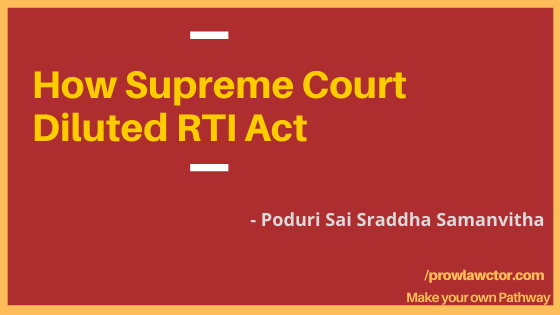How Supreme Court Diluted RTI Act?

In November, the Supreme Court of India brought the office of the Chief Justice of India under the purview of RTI Act, 2005. The Supreme Court has held that the CJI’s office is a public authority and falls within the ambit of RTI Act.[1] At the same time, the judgment diluted the RTI Act by putting additional bars to obtain information. The judgment “expanded the power, length and depth of exceptions under section 8 of the Act”. Section 8 of the RTI Act has mentioned the exceptions under this Act where anything asked for other than these exceptions are an exercise beyond the ambit of the Act. The Supreme Court held that personal records include name, address, physical, mental and psychological status, professional records including evaluation records and disciplinary proceedings.
Medical records, information related to assets, liabilities, and income tax returns are also considered as personal information. Such personal information shall be excluded from the RTI Act as it is an unwarranted invasion of privacy and conditional access is available where stipulation of larger public interest is involved. Understand the impact of this judgement in reference to how it would affect the scope of the RTI Act which states that public shall get information in most situation whereas this judgement narrow down the chances of getting information in most situation by putting high bars to it.
Recently, Supreme Court passed an order asking RBI to not make bank financial inspection reports, risk assessment reports and bank’s inspection reports available to public. This Supreme Court verdict upholding the decision of RBI denying the release of the information to the public is problematic and against the true spirit of RTI Act.[2] In 2012, the Supreme Court in the case of Girish Ramchandra Deshpande v. Central Information Commissioner[3] held that information on record of public servants cannot be disclosed unless it involves a larger public interest. The Indian Government has used this judgment extensively in the matters of not revealing information through RTI.
In the Canara Bank v. C.S. Shyam case[4], the Supreme Court ruled that personal information pertaining to individual bank employees has nothing to do with public interest and held that it shall be exempted from the RTI Act, 2005. Just before the outbreak of corona virus pandemic, in the month of March, the Supreme Court delivered another judgment that further limited the scope of RTI Act. In the case of Chief Information Commissioner v. High Court of Gujarat[5], the Supreme Court held that citizens are barred from securing access to court records under RTI Act, 2005. The court further held that the court records can only be accessed through the rules laid down by their respective high courts under Article 225 of the Indian Constitution.
The ruling of the Supreme Court over tuned a core principal of the RTI Act where no reasons are required to be given for requesting information under the Act. In this case, the supreme court of India faced with an apparent conflict between two laws. The RTI Act, 2006 says that no reasons are required to be given for requesting the information sought under an RTI application where as the Gujarat High Court rules 1993 states that when a third party seeks certified copies of the documents of any case proceedings, their application must be supported with an affidavit stating the grounds on which the documents are required. The Supreme Court ruled that there is no inconsistency between the rules in the Act. The judgment reasoned that the high court rules do not forbid the dissemination of information but actually provides a different procedure to obtain the data or information. So they cannot be held to be incoherent with the RTI Act.
The judgement of the Supreme Court is based on the legal principle of “Analyzing a legal provision relevant to the issue at hand, the provision must be read in its entirety.” Unfortunately the court overlook the significant segment of the rule which states that unless the court registrar is satisfied, information shall not be given to the third party. This ultimately means that dissemination of information is limited to limited situation whereas the objective of the RTI Act is to disseminate the information in most situation. This judgment sets a bad precedent as different governmental authorities would follow the step by adopting similar Rules for themselves and this would further stifle the RTI Act.
In this time of pandemic and uncertainties it is important that we do not overlook the matters and issues that will haunt us once this covid19 pandemic has been overcome. It is essential for the judiciary to produce right judgment with right legal reasoning so that the accountability of the government toward citizens always remain high. It’s the third pillar of the democracy which is expected to make democracy much stronger with each passing day, but judgements of such nature which are diluting the RTI are surely not the correct step in this direction.
– Poduri Sai Sraddha Samanvitha
[1] Civil appeal No. 10044 of 2010
[2] SC judgment on RTI Act sets a dangerously low bar for what passes muster as law of land ThePrint, https://theprint.in/opinion/sc-judgment-on-rti-act-sets-dangerous-precedent/395518/
[3] Special leave petition (civil) No. 27734 of 2012
[4] Civil appeal No. 22 of 2009
[5] Civil appeal No(s). 1966-1967 of 2020







